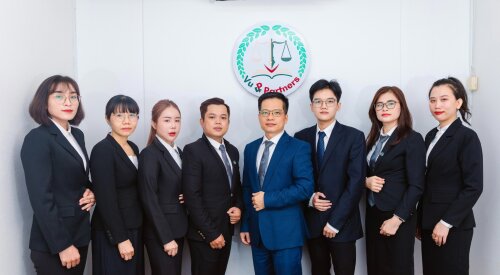Best Agriculture Lawyers in Khanh hoa
Share your needs with us, get contacted by law firms.
Free. Takes 2 min.
List of the best lawyers in Khanh hoa, Vietnam
About Agriculture Law in Khanh hoa, Vietnam
Khanh hoa is a coastal province in south-central Vietnam, renowned for its diverse agriculture sector. The region is home to rice paddies, sugar cane fields, fruit orchards, and a vibrant aquaculture industry specializing in shrimp and fish farming. Agriculture plays a vital role in local livelihoods, supporting both rural families and the broader economy. However, as the sector evolves, farmers and agri-businesses in Khanh hoa face unique challenges related to land use, water management, environmental protection, and compliance with government policies.
Agriculture law in Khanh hoa is influenced by both national legislation and specific local ordinances. These regulations govern a variety of issues ranging from land tenure, crop and livestock production, seafood harvesting, environmental protection, and export standards. Understanding these legal frameworks is crucial for anyone involved in agriculture, whether as a smallholder, business owner, or investor.
Why You May Need a Lawyer
Agricultural activities are deeply regulated in Vietnam, and Khanh hoa is no exception. You may require legal advice in situations such as:
- Disputes over agricultural land use or ownership, such as unclear property boundaries or inheritance issues
- Resolving conflicts with neighbors or local authorities regarding water rights or environmental compliance
- Complying with agricultural land conversion policies or leasing land from the government
- Registering agricultural cooperatives or forming agri-business partnerships
- Handling export regulations for farm products, seafood, or processed goods
- Navigating laws related to pesticide use, food safety, and crop protection
- Negotiating and drafting farm contracts or aquaculture agreements
- Defending against government penalties or fines related to environmental violations or zoning laws
Legal professionals specializing in agriculture can help safeguard your rights, prevent costly mistakes, and ensure that your farming or business activities remain compliant with the law.
Local Laws Overview
Key regulations in Khanh hoa pertaining to agriculture are derived from Vietnam’s national laws but often feature local implementation policies. Notable aspects include:
- Land Ownership and Use: Agricultural land in Vietnam is generally state-owned and allocated to individuals or organizations for use. Transferring, leasing, or changing the purpose of land use requires approval from local authorities. Recent reforms encourage longer-term leases to enhance tenant security.
- Water Rights and Management: Water for irrigation and aquaculture is regulated to protect resources and ensure fair distribution. Permits may be needed for certain water uses, especially for large-scale farming or aquaculture operations.
- Environmental Protection: Laws restrict the use of certain chemicals, regulate waste management, and aim to prevent environmental pollution. Violation of these laws can result in significant penalties.
- Export and Import Standards: Agricultural exports, especially seafood, must meet both Vietnamese and international safety and quality standards.
- Agricultural Cooperatives: Local policies guide the formation and operation of cooperatives to promote collective bargaining and resource sharing among farmers.
Local authorities in Khanh hoa may also issue specific regulations tailored to the coastal and rural characteristics of the province, such as stipulations for mangrove protection or sustainable fishing practices.
Frequently Asked Questions
Is it possible for private individuals to own agricultural land in Khanh hoa?
Under Vietnamese law, all land is owned by the state. Individuals and entities receive land use rights, which can be transferred, inherited, or leased but not owned outright in the private sense.
Can local authorities reclaim land allocated for agriculture?
Yes, authorities can reclaim land for public purposes such as infrastructure or community projects. Compensation policies apply, but disputes over compensation rates or qualification sometimes arise.
Do I need approval to change the use of my agricultural land?
Yes, converting agricultural land to non-agricultural use or to a different crop or livestock purpose usually requires approval from relevant local authorities.
What are the requirements for using pesticides and fertilizers?
Only government-approved chemicals may be used. Storage, sale, and application are regulated to minimize environmental and health risks. Violation may lead to penalties.
Are there special rules for aquaculture and seafood processing in Khanh hoa?
Yes, there are specific licensing requirements for aquaculture, including environmental impact assessments and regular inspections to ensure product safety and sustainability.
How are agricultural cooperatives formed?
Farmers can voluntarily join together to form cooperatives under local guidance. Registration with the district-level agency is required and clear by-laws must be established.
What happens if I violate environmental protection laws related to agriculture?
Penalties can include fines, suspension of activities, or in severe cases, criminal prosecution. Restitution requirements may also apply.
How are contracts for farm tenancy or produce sales enforced?
Written contracts are highly recommended and legally recognized. Disputes can be brought before a court or resolved through mediation facilitated by local authorities.
Do I need a business license to process or export agricultural products?
Yes, most forms of processing and export require a business license from the local Department of Planning and Investment, as well as compliance with health and safety standards.
Where can I get help if I have a dispute or legal question about agriculture?
You can consult with a licensed lawyer, approach the local Department of Agriculture and Rural Development, or request mediation from your commune or district People's Committee.
Additional Resources
- Khanh hoa Department of Agriculture and Rural Development: Offers guidance on local agricultural policies, land issues, and support programs for farmers.
- Khanh hoa Farmers’ Association: Assists members with legal advice, cooperative formation, and agricultural technology transfer.
- Legal Aid Centers: Provide free or low-cost legal counseling for eligible individuals, including rural farmers.
- Local People's Committees: The administrative body to contact for permits, land affairs, and dispute resolution.
- Ministry of Agriculture and Rural Development (central level): Sets national policies and standards for agricultural practice and food safety.
Next Steps
If you need legal assistance regarding agriculture in Khanh hoa:
- Identify the nature of your issue, such as land disputes, compliance questions, or contract concerns.
- Gather all relevant documents, such as land-use certificates, contracts, correspondence, and official notices.
- Contact a licensed lawyer with experience in agricultural law for an initial consultation. They can clarify your rights, options, and potential outcomes.
- If cost is a concern, inquire with local legal aid centers or the Farmers’ Association for support or referrals.
- Consider alternative dispute resolution through mediation by local authorities if appropriate.
- Maintain accurate records and follow up on advice to ensure all actions stay within legal guidelines.
Understanding and complying with agricultural laws in Khanh hoa is essential for your farming activities and business success. Seeking early legal advice can help you avoid costly errors and confidently resolve any issues that arise.
Lawzana helps you find the best lawyers and law firms in Khanh hoa through a curated and pre-screened list of qualified legal professionals. Our platform offers rankings and detailed profiles of attorneys and law firms, allowing you to compare based on practice areas, including Agriculture, experience, and client feedback.
Each profile includes a description of the firm's areas of practice, client reviews, team members and partners, year of establishment, spoken languages, office locations, contact information, social media presence, and any published articles or resources. Most firms on our platform speak English and are experienced in both local and international legal matters.
Get a quote from top-rated law firms in Khanh hoa, Vietnam — quickly, securely, and without unnecessary hassle.
Disclaimer:
The information provided on this page is for general informational purposes only and does not constitute legal advice. While we strive to ensure the accuracy and relevance of the content, legal information may change over time, and interpretations of the law can vary. You should always consult with a qualified legal professional for advice specific to your situation.
We disclaim all liability for actions taken or not taken based on the content of this page. If you believe any information is incorrect or outdated, please contact us, and we will review and update it where appropriate.










